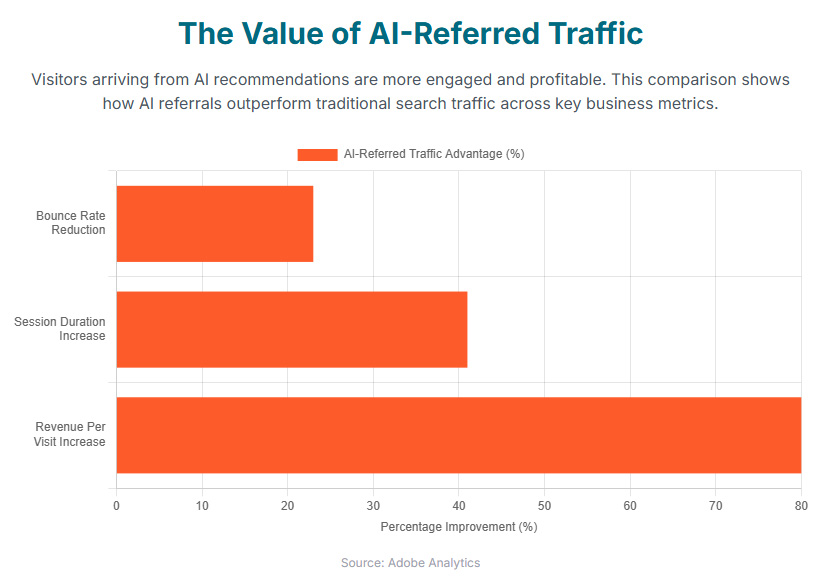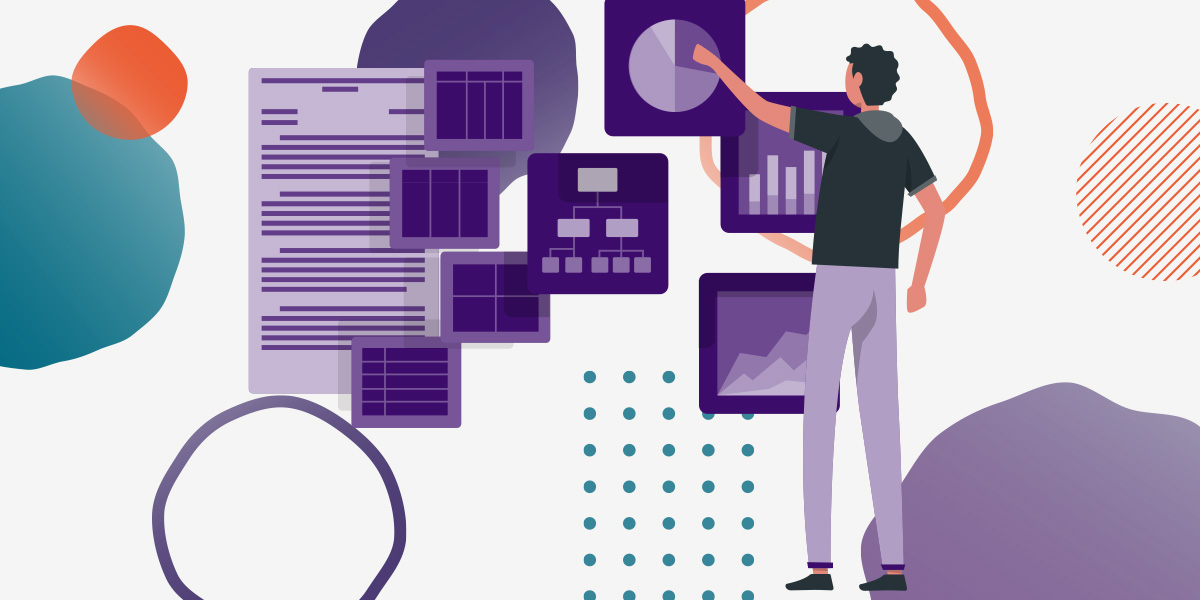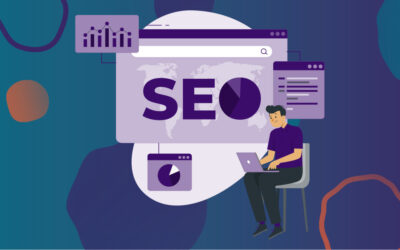Introduction: The Great Traffic Shift
A fundamental transformation is underway in how we discover information, products, and services online. For two decades, Google’s ten blue links were the primary gateway to the internet, and search engine optimisation (SEO) was the art of climbing that ranked list. Today, that model is being fundamentally disrupted. The rise of sophisticated AI-powered search engines and digital assistants marks the most significant shift in digital marketing since the advent of the smartphone.
Conversational AI platforms like ChatGPT, Google’s Gemini, Perplexity, and Microsoft’s Copilot are no longer just novelties; they are rapidly becoming the preferred discovery tools for millions of users. Instead of sifting through pages of search results, users now receive direct answers to their questions and product recommendations within a single conversational interface.
This shift is creating a new digital divide. In June 2025, AI-driven referrals to the top 1,000 websites surged to an incredible 1.13 billion visits, representing a 357% year-on-year increase (TechCrunch, 2025). This isn’t a slow burn; it’s an explosive rerouting of the internet’s lifeblood: traffic. While forward-thinking businesses are adapting their strategies to capture this lucrative new stream of high-intent visitors, those who are still relying solely on SEO are experiencing a slow, inexplicable decline in visibility.
Gartner predicts that by 2026, traditional search engine volume will drop by 25%, with search marketing losing market share to AI-powered “answer engines” for the first time. Those who resist and refuse to adapt to AI risk becoming invisible.
Explosive Growth
%
Year-on-year increase in AI-driven referral traffic to major websites
Source: TechCrunch
The Main Players: A New Digital Pantheon
Understanding the evolution and rising dominance of AI search requires looking beyond a single platform. Each of the new AI interfaces offer a unique approach to delivering information and recommendations. Optimising for this new landscape means understanding their individual strengths.
- ChatGPT (OpenAI): The platform that brought generative AI into the mainstream, ChatGPT excels at conversational recommendations. It often acts as a personal shopping assistant or a research analyst, synthesising information from its training data and, more recently, live web sources to provide detailed, human-like product and service suggestions. Its dominance in referral traffic makes it a primary target for optimisation.
- Gemini (Google): As Google’s flagship AI, Gemini is deeply integrated into the world’s most-used search engine. It powers the new “AI Overviews” that appear at the top of search results, providing direct answers that can negate the need to click on traditional links. For businesses, being cited as a source within a Gemini overview is the new “ranking number one.” Its ability to understand context and user intent is reshaping click-through behaviour on a massive scale.
- Perplexity AI: Perplexity’s unique selling proposition is trust and transparency. It functions as a “conversational answer engine” that provides clear, concise answers complete with inline citations and sources. This makes it particularly powerful for B2B and high-consideration purchases where users value verifiable information. Getting your website cited by Perplexity builds immense credibility and drives highly qualified traffic.
- Copilot (Microsoft): Integrated across the Microsoft ecosystem, including Windows and the Edge browser, Copilot acts as an everyday AI companion. It blends web search with user context to assist with productivity and purchasing decisions. Its deep integration into enterprise environments also makes it a critical channel for B2B marketers looking to reach decision-makers within their workflow.
- Claude (Anthropic): Known for its focus on safety and its ability to handle large amounts of text, Claude provides thoughtful, in-depth conversational responses. It’s often used for more complex research queries, making it a valuable platform for businesses selling technical products or specialised services. Optimising for Claude involves providing detailed, well-structured content that it can synthesise into comprehensive answers.
Opportunity and Business Impact: Beyond Clicks to Conversions
The traffic being driven by these AI platforms is not just high in volume, it’s valuable too. Unlike traditional search, where users often click multiple links, AI-driven referrals tend to come from users who have already had their initial questions answered. They arrive further down the conversion funnel, with a clearer intent to purchase or engage.
The data paints a compelling picture. A landmark study by Adobe Analytics revealed that travel websites experienced a staggering 17x increase in AI-driven referrals, leading to 80% more revenue per visit compared to traditional search traffic. The engagement metrics are equally impressive: bounce rates from AI referrals are 23% lower, and session durations are 41% longer. This isn’t just traffic; it’s highly qualified, engaged, and profitable attention.
This trend holds across industries. News publishers, while initially seeing declines from traditional search, have found that being featured in AI summaries drives a more dedicated readership. E-commerce brands are discovering that AI recommendations act as powerful, trusted endorsements, leading to higher conversion rates. The message from the market is clear: optimising for AI search is not merely a defensive strategy to reclaim lost traffic; it is an offensive manoeuvre to capture a more valuable and engaged customer base. Businesses that master this new channel are not just surviving the shift—they are thriving because of it.

The Optimisation Process: Teaching AI to Recommend You
So, how do you position your products and services to be found and recommended by these AI engines?
The process, which we at Maratopia call AI Search Optimisation (AISO), is a multi-layered strategy that evolves traditional SEO principles for an AI-first world. It’s about structuring your digital presence so that AI can easily understand, trust, and endorse what you offer.
1. Technical Foundations: Structured Data and Schema Markup
At its core, AISO is about clear communication with machines. Schema markup is a vocabulary of code that you add to your website to help search engines understand the context of your content. For AI, it’s not just helpful; it’s essential. By using schema for products (detailing price, availability, reviews), services (outlining what you do, for whom, and where), and articles (identifying the author, topic, and key findings), you are essentially spoon-feeding AI platforms the exact information they need. This dramatically increases the likelihood of your business being accurately represented and recommended in search results.
2. Optimised Product and Service Pages
Your core commercial pages must be built to answer questions. Think beyond keywords to the conversational queries a potential customer might ask an AI assistant. A product page should not only list features but also answer “Which camera is best for travel vlogging?” or “Is this software compatible with my existing systems?”. This means creating comprehensive descriptions, detailed specifications, and, crucially, embedding a rich FAQ section on each page. Content should be structured with clear headings, bullet points, and tables that an AI can easily parse and synthesise into a neat, confident answer for its user.
3. The Power of Content: Answering the “Why” and “How”
While product pages answer “what,” your blog and resource centre are where you answer the “why” and “how.” This is your opportunity to become the go-to authority in your niche. By conducting research into the questions users are asking AI, you can create a content strategy that directly addresses their needs. Articles like “The Ultimate Guide to Choosing a Financial Advisor” or “Comparing the Top 5 Project Management Tools for Small Businesses” are precisely the kind of expert, unbiased content that AI engines love to cite. This content not only drives direct referral traffic but also builds a “knowledge graph” around your brand, cementing your authority and making it more likely that an AI will recommend your products and services in related commercial queries.
Frequently Asked Questions (FAQs)
Will AI completely replace SEO?
No. It’s more accurate to say SEO is evolving into AISO. The foundational principles of SEO—a technically sound website, high-quality content, and building authority—remain as important as ever. However, the strategy must now be tailored for an AI audience. The focus is shifting from ranking for keywords to being the source for AI-generated answers.
How quickly can I expect to see results from AISO?
The timeline for results can vary. Some businesses with a strong existing domain authority and well-structured content may see improvements in AI visibility within a few weeks of implementing technical changes. For others in more competitive industries, it may take several months to build the necessary content authority. The key is that AISO is a long-term strategy, not a short-term tactic. The competitive advantages being built today will pay dividends for years to come.
Do I really need to implement schema markup?
Yes, absolutely. In the era of AI search, schema is non-negotiable. It is the single most effective way to communicate the structure and meaning of your content to AI platforms. Without it, you are forcing them to guess, which significantly reduces your chances of being featured, cited, or recommended.
Is the traffic from AI search actually valuable?
Yes, exceptionally so. As the Adobe data confirms, visitors arriving from an AI referral are typically much further along in their buying journey. They have already had their initial research questions answered by the AI and are now seeking to validate their choice or make a purchase. This results in higher engagement rates, longer session durations, and significantly greater revenue per visit.
The Unignorable Statistics of the AI Search Era
The data underscores the urgency and scale of this transformation:
- Explosive Referral Growth: AI-driven referral traffic to major websites grew 357% year-on-year (TechCrunch).
- Shifting User Preference: In the UK, 62% of users now state a preference for using AI tools over traditional search engines for information discovery (Tom’s Guide).
- A Multi-Billion Pound Market: The AI search engine market is projected to skyrocket from $43.6 billion in 2025 to $108.9 billion by 2032 (Coherent Market Insights).
- The Rise of Voice: There are now over 8.4 billion voice assistant devices in use globally (DemandSage), almost all of which are powered by AI engines to answer queries and recommend products. This channel is entirely inaccessible without an AISO strategy.
Conclusion: Seizing the Future with Maratopia
The transition to an AI-first digital landscape is not a distant future; it is happening right now. The businesses that will win the next decade are those that act decisively to align their digital strategy with this new reality. Waiting is no longer an option.
At Maratopia, we have been at the forefront of this shift. We recognised early that succeeding in this new era requires more than just updated SEO tactics. It demands a new methodology that takes the previous SEO strategies that worked so well and adapts them to the new AI dominated digital space.
Our proprietary diagnostic toolkit doesn’t just track rankings; it analyses how your website, products, and services are perceived and referenced by the leading AI platforms. We identify the semantic gaps between the questions your customers are asking and the answers your website is providing.
By combining meticulous structured data implementation, sophisticated AI behaviour mapping, and the creation of high-impact content designed to be digested and recommended by AI, we enable our clients to get ahead of the curve. Our customers are already capturing high-value traffic from AI referrals, experiencing measurable lifts in engagement and, most importantly, sales.
Don’t let your business become invisible in the age of AI. Contact Maratopia today to discover how our unique approach to AI Search Optimisation can secure your place in the future of digital discovery.







